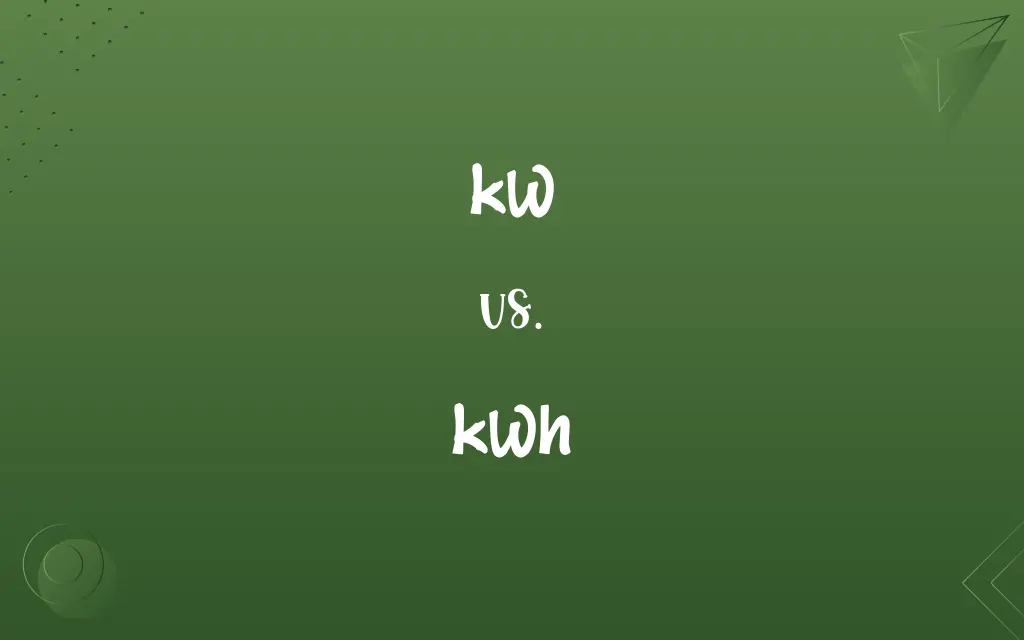kW vs. kWh: Know the Difference

By Shumaila Saeed || Updated on December 25, 2023
kW (kilowatt) is a unit of power, representing the rate of energy use or production, whereas kWh (kilowatt-hour) is a unit of energy, representing the total amount of energy used or produced over time.

Key Differences
Kilowatt (kW) is a measurement of power, indicating how fast energy is being used or generated at a specific moment. It's akin to the speed of a car, measuring instantaneous usage. Kilowatt-hour (kWh), on the other hand, measures the total energy used over a period. It's like the distance traveled by a car, indicating cumulative usage.
Shumaila Saeed
Dec 17, 2023
When we refer to kW, we're talking about the capacity of an electrical device, like a light bulb or a generator, to use or produce energy at any given instant. It's the rate at which energy is consumed or generated. In contrast, kWh is a measure of actual energy used or generated over time, like the electricity consumed by a house in a day.
Shumaila Saeed
Dec 17, 2023
For example, a 1 kW heater uses energy at a rate of 1 kilowatt. If it runs for one hour, it will consume 1 kWh of energy. Thus, kW indicates the power level of the heater, while kWh reflects the total energy consumed during its operation.
Shumaila Saeed
Dec 17, 2023
Understanding the difference between kW and kWh is crucial for energy management and billing. Electricity bills often charge for kWh, the total energy used, rather than kW, the rate of use. This distinction helps consumers understand their energy consumption patterns over time.
Shumaila Saeed
Dec 17, 2023
In summary, kW is about the 'speed' of energy usage, while kWh is about the 'distance' or the total amount of energy used. Both are essential in different contexts: kW for understanding the capacity and kWh for measuring actual usage.
Shumaila Saeed
Dec 17, 2023
ADVERTISEMENT
Comparison Chart
ADVERTISEMENT
kW and kWh Definitions
kW
KW is used to express the power level of engines and motors.
The car's engine has a peak power of 150 kW.
Shumaila Saeed
Dec 12, 2023
kWh
KWh is a key metric in calculating energy efficiency and cost.
By reducing our energy use to 250 kWh per month, we can save on utility bills.
Shumaila Saeed
Dec 12, 2023
kW
KW indicates the capacity of electrical devices.
Our new generator can provide up to 10 kW of power.
Shumaila Saeed
Dec 12, 2023
kWh
KWh reflects cumulative energy consumption or production.
The solar panels produced 200 kWh of energy this month.
Shumaila Saeed
Dec 12, 2023
kW
KW is a unit of power equal to one thousand watts.
A 5 kW solar panel system generates sufficient power for a small household.
Shumaila Saeed
Dec 12, 2023
ADVERTISEMENT
kWh
KWh measures the total amount of electricity used over time.
Last month, our household consumed 300 kWh of electricity.
Shumaila Saeed
Dec 12, 2023
kW
KW measures the rate of energy production or consumption.
This air conditioner has a maximum output of 3 kW.
Shumaila Saeed
Dec 12, 2023
kWh
KWh is a billing unit for energy in residential and commercial electricity usage.
My electricity bill shows I used 450 kWh in July.
Shumaila Saeed
Dec 12, 2023
kW
KW quantifies the instantaneous use of electrical power.
The electric stove uses about 2 kW when on high heat.
Shumaila Saeed
Dec 12, 2023
kWh
KWh is a unit of energy equivalent to one kilowatt of power sustained for one hour.
Running a 1 kW heater for 5 hours will consume 5 kWh of energy.
Shumaila Saeed
Dec 12, 2023
Repeatedly Asked Queries
Why do electricity bills use kWh?
kWh measures total energy consumption over time, making it practical for billing.
Shumaila Saeed
Dec 17, 2023
What is kW used for?
kW is used to measure the rate of energy use or generation, like the power capacity of appliances.
Shumaila Saeed
Dec 17, 2023
How is kWh calculated?
kWh is calculated by multiplying power in kW by the time in hours it's used.
Shumaila Saeed
Dec 17, 2023
What does a 2 kW device mean?
It means the device consumes or produces energy at a rate of 2 kilowatts.
Shumaila Saeed
Dec 17, 2023
Why do large appliances list kW?
To indicate their maximum power use or generation rate.
Shumaila Saeed
Dec 17, 2023
Can kW and kWh be converted into each other?
They represent different concepts (rate vs. total use) and are not directly convertible.
Shumaila Saeed
Dec 17, 2023
How does kWh impact energy costs?
Higher kWh means more energy used, increasing electricity costs.
Shumaila Saeed
Dec 17, 2023
Is kW a measure of energy efficiency?
kW indicates power capacity, not efficiency; kWh can better indicate efficiency over time.
Shumaila Saeed
Dec 17, 2023
Can a device with high kW be energy efficient?
Yes, if it uses high power for a short time, resulting in low kWh.
Shumaila Saeed
Dec 17, 2023
Does a lower kW always mean less energy use?
Not necessarily; total energy use (kWh) also depends on usage duration.
Shumaila Saeed
Dec 17, 2023
What role does kWh play in renewable energy?
It measures the total energy produced by renewable sources over time.
Shumaila Saeed
Dec 17, 2023
What’s an example of kWh in daily life?
Running a 1 kW appliance for 3 hours uses 3 kWh of energy.
Shumaila Saeed
Dec 17, 2023
How do solar panels use kW and kWh?
Panel capacity is in kW, and energy produced over time is in kWh.
Shumaila Saeed
Dec 17, 2023
Is kWh relevant for solar energy storage?
Absolutely, as it measures the energy stored and used from solar panels.
Shumaila Saeed
Dec 17, 2023
Are kW and kWh related to green energy?
Yes, they're used to quantify energy use and production in green technologies.
Shumaila Saeed
Dec 17, 2023
How does a battery's capacity relate to kWh?
It's measured in kWh, indicating how much energy it can store.
Shumaila Saeed
Dec 17, 2023
Can reducing kW usage lower kWh?
Yes, using less powerful devices can reduce total kWh consumption.
Shumaila Saeed
Dec 17, 2023
How do smart meters use kW and kWh?
Smart meters measure and report power use in kW and total consumption in kWh.
Shumaila Saeed
Dec 17, 2023
What's more important for saving energy, kW or kWh?
kWh, as it reflects total energy use over time.
Shumaila Saeed
Dec 17, 2023
Is kWh important for electric vehicles?
Yes, it measures the energy used by the vehicle over time.
Shumaila Saeed
Dec 17, 2023
Share this page
Link for your blog / website
HTML
Link to share via messenger
About Author
Written by
Shumaila SaeedShumaila Saeed, an expert content creator with 6 years of experience, specializes in distilling complex topics into easily digestible comparisons, shining a light on the nuances that both inform and educate readers with clarity and accuracy.









































































